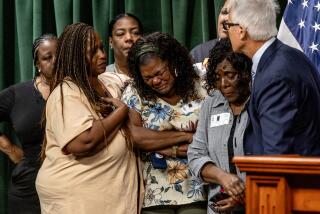Librarian’s Kindness May Have Been Fatal
- Share via
Meta Frances Murphy was known for her kindness.
And police said she might have died as a result of it.
From cats to children--and their parents--the 62-year-old librarian often opened her doors to others in her Northridge condominium complex, neighbors said. “You have to be an idiot not to like her,” said neighbor Gitta Ruivenkamp, who knew Murphy for three years. “She was very nice and open and friendly.”
Murphy, who was unmarried and lived alone, made friends with three teen-age girls who lived next door and often played in the grassy area outside their front doors. Although they were not close, she often invited them into her home, serving them dinner or a snack after school while their parents were still at work, neighbors said.
The three girls, whose names have not been released, on Friday were charged with stabbing Murphy to death last fall.
Each of the girls--ages 17, 16 and 13--appeared in Sylmar Juvenile Court on Friday and denied a charge of murder--the legal equivalent of pleading not guilty in a higher court. All three were being held by juvenile authorities pending a hearing Thursday.
Deputy Dist. Atty. William J. Ryder said he will decide today whether to ask that the oldest girl stand trial as an adult. Under California law, a suspect who was 16 or older at the time of a crime can be tried as an adult.
If the girls are unlikely murder suspects, then Murphy was an unlikely victim, a churchgoing, cheerful woman who made a point of befriending fellow residents of the Peppertree condominium complex, occasionally sharing her Christian Science faith.
“She would take my kids to church, because I usually work Sundays,” Ruivenkamp said.
Neighbors described the girls’ family as very religious, but boisterous. Often playing loud music, the family led at least one neighbor to believe that two full families lived in the four-bedroom condominium. In fact, it was just the girls, their parents and two other siblings.
They made a loud counterpoint to Murphy, who filled her residence with books and magazines that she, befitting her profession, lent out. A recurring memory of Murphy, neighbors said, is of her sitting in her patio reading.
The two older girls, meanwhile, attended a continuation school while the youngest went to Topeka Drive Elementary School, police said.
Ruivenkamp’s 14-year-old daughter, Gila, who has attended school with the girls accused in the slaying, said the two younger girls occasionally bullied smaller children but never acted especially violent. She recalled how the 16-year-old once pushed another child off his bike and the 13-year-old, while roller-skating, deliberately knocked down a smaller child as she passed.
“They were just little things,” Gila said. “I thought it was kind of rude, but I never thought they were people that would do something really bad.”
Murphy was a familiar figure in the sprawling complex at Mayall Street and Reseda Boulevard. Many saw her feeding her two cats along with cats belonging to other residents, including the pets of the girls accused of killing her.
“She loved her cats, and would talk about her cats and trips she would take,” said Frank Navarro, a librarian at the Panorama City branch where Murphy worked. She had worked in the library system for about 20 years and had been at that branch for more than 10 years as an adult reference librarian.
On Nov. 21, another friend of Murphy’s told Ruivenkamp that the librarian had not reported to work that day. They walked over to Murphy’s residence and entered through an open patio door after knocking repeatedly at the locked front entrance. They saw blood stains throughout the main room but did not see her body. They left quickly and called police.
Police found Murphy’s body several hours later in a closet, covered with five neatly placed coats. She had been beaten and stabbed 11 times in the back, police said. There was no evidence of forced entry or robbery. Valuable property in the residence was left behind.
Police had no clues in the case until last week when two teen-agers came forward and said the three girls had bragged about the killing about a week after it occurred.
Gitta Ruivenkamp said the slaying changed the neighborhood, spurring several families to move out.
“It’s not the same for any of us. . . . Every time I walk by Meta’s home I feel creepy,” she said. “I look at her patio and think ‘Meta, how did this happen to you?’ ”
More to Read
Sign up for Essential California
The most important California stories and recommendations in your inbox every morning.
You may occasionally receive promotional content from the Los Angeles Times.











